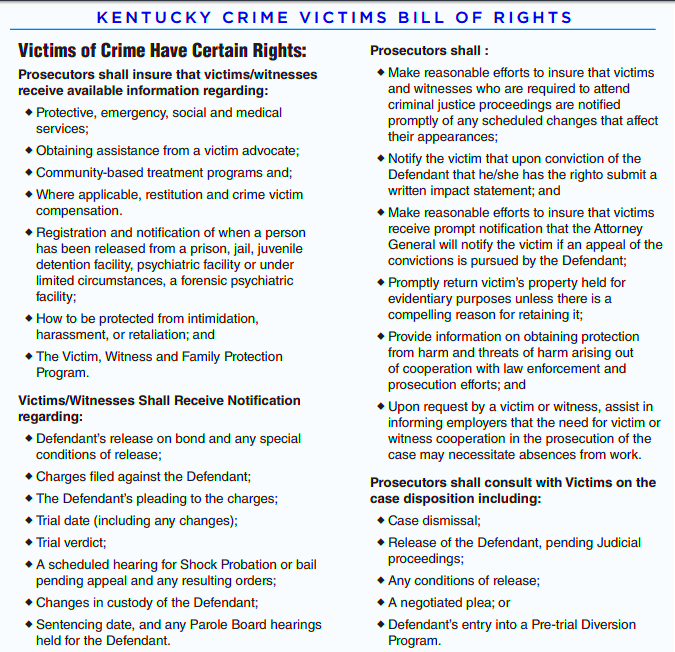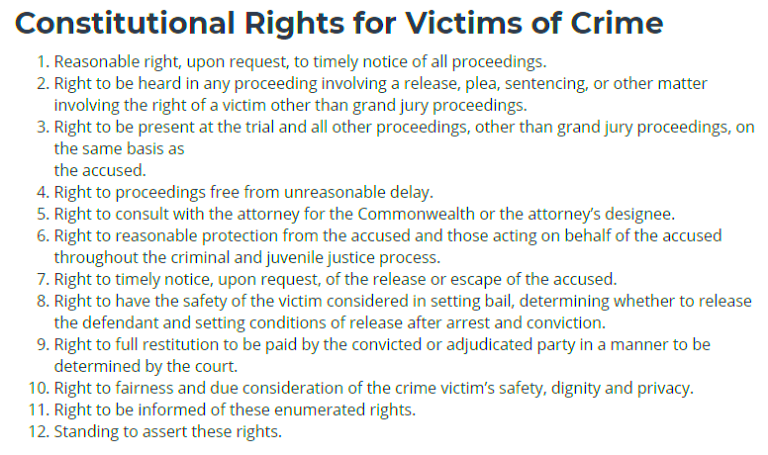Understanding Marsy’s Law in Kentucky
Marsy’s Law is an important legal framework that aims to protect the rights of victims of crime in Kentucky. Named after Marsy Nicholas, a victim of domestic violence, this law was designed to ensure that victims have a voice in the legal process. It emphasizes the need for victims to be informed and involved, giving them a sense of empowerment and security during difficult times.
Purpose of Marsy’s Law

The main goal of Marsy’s Law is to provide victims with essential rights that help them navigate the criminal justice system. By establishing these rights, the law seeks to:
- Enhance Victim Rights: Ensure that victims have the same legal standing as defendants in criminal cases.
- Promote Safety: Provide victims with information about their rights and the legal process, helping them feel safer.
- Encourage Participation: Allow victims to participate actively in their cases, giving them a voice in decisions that affect their lives.
Overall, the purpose is to create a more balanced and fair legal system for all parties involved, recognizing the challenges that victims face.
Key Provisions of Marsy’s Law

Marsy’s Law includes several key provisions that directly benefit crime victims. These provisions outline the rights victims are entitled to during the criminal justice process. Some of the most significant provisions include:
- Right to Be Informed: Victims have the right to be informed about the proceedings of their case, including changes in court dates and plea deals.
- Right to Attend Court: Victims can attend court hearings, ensuring they are present during important moments in their case.
- Right to Be Heard: Victims have the opportunity to present their views on matters affecting their rights, such as bail or sentencing.
- Right to Protection: Measures should be in place to protect victims from harassment or intimidation by the accused.
- Right to Privacy: Victims’ personal information must be kept confidential to ensure their safety and well-being.
These provisions empower victims and promote their involvement in the justice system, allowing them to play an active role in the outcomes of their cases.
Rights Granted to Victims

Marsy’s Law grants several essential rights to victims of crime, ensuring they are treated with dignity and respect throughout the legal process. These rights are designed to empower victims and give them a voice in what can often feel like a daunting system. Here are some of the key rights granted:
- Right to Notification: Victims have the right to receive timely notifications regarding court proceedings and changes in the status of the case.
- Right to Participate: Victims can participate in various stages of the legal process, including plea negotiations and sentencing hearings.
- Right to Restitution: Victims are entitled to seek restitution for damages caused by the crime, helping them recover financially and emotionally.
- Right to Safety: Victims have the right to protection from the accused, which can include restraining orders or other protective measures.
- Right to Access Services: Victims can access support services, such as counseling or advocacy, to help them cope with the aftermath of the crime.
These rights are crucial in ensuring that victims feel supported and informed, helping them reclaim a sense of control over their lives during a challenging time.
Impact on Criminal Justice System
Marsy’s Law significantly impacts the criminal justice system in Kentucky, reshaping how victims are treated and involved in legal proceedings. Here are some of the notable changes:
- Increased Awareness: Law enforcement and legal professionals are now more aware of victims’ rights, which promotes better communication and support.
- Enhanced Victim Services: The law has led to the development of programs and resources specifically designed to assist victims, such as advocacy groups and counseling services.
- Greater Accountability: The law holds the criminal justice system accountable for protecting victims and ensuring their rights are upheld.
- Shift in Focus: There is a greater emphasis on victim-centric approaches, which consider the needs and perspectives of victims throughout the legal process.
These changes create a more balanced system, recognizing the importance of victims’ experiences and rights within the justice framework.
Implementation of Marsy’s Law
Implementing Marsy’s Law involves several steps to ensure that its provisions are effectively integrated into the criminal justice system. This process requires cooperation among various stakeholders, including law enforcement, prosecutors, and victim services. Here’s how implementation typically unfolds:
- Training and Education: Law enforcement and legal professionals receive training on the rights granted under Marsy’s Law, ensuring they understand their responsibilities.
- Policy Development: Agencies develop policies and procedures that align with the provisions of the law, creating clear guidelines for protecting victims’ rights.
- Resource Allocation: Funding and resources are directed toward victim support services, ensuring that victims can access the help they need.
- Monitoring and Evaluation: Ongoing monitoring is essential to assess the effectiveness of Marsy’s Law in practice, allowing for adjustments and improvements over time.
Through careful implementation, Marsy’s Law can make a meaningful difference in the lives of victims, ensuring their rights are upheld and respected throughout the legal process.
Challenges and Criticisms of Marsy’s Law
While Marsy’s Law aims to enhance the rights of victims, it hasn’t been without its challenges and criticisms. Many experts and advocates raise important concerns about its implementation and effects. Here are some of the most common issues:
- Funding Concerns: Implementing the provisions of Marsy’s Law requires significant funding for victim services and training. Critics argue that without proper funding, the law may not effectively support victims.
- Confusion in Legal Proceedings: Some legal professionals worry that the law’s provisions can create confusion in the courtroom, potentially complicating legal processes.
- Balancing Rights: Critics express concern about how to balance the rights of victims with the rights of defendants. They argue that the law may unintentionally infringe upon defendants’ rights.
- Limited Awareness: Many victims and even some law enforcement personnel may not be fully aware of the rights provided under Marsy’s Law, leading to inconsistent application.
These challenges highlight the need for ongoing discussions and potential revisions to ensure that the law effectively serves its intended purpose while addressing the complexities of the criminal justice system.
Future of Marsy’s Law in Kentucky
The future of Marsy’s Law in Kentucky looks promising, but it also depends on continued advocacy and adaptation. As the legal landscape evolves, several factors will influence how the law develops:
- Increased Advocacy: Victims’ rights advocates are crucial in promoting awareness and ensuring that the law is implemented effectively. Their efforts can lead to improvements in victim support services.
- Legislative Revisions: Ongoing evaluation may lead to necessary revisions to address the challenges faced during implementation, ensuring that victims’ rights are fully respected.
- Community Engagement: Engaging communities in conversations about victims’ rights can help raise awareness and foster a supportive environment for victims seeking justice.
- Collaboration Among Stakeholders: Continued collaboration between law enforcement, legal professionals, and victim advocates is essential for the law’s success.
By focusing on these areas, Kentucky can ensure that Marsy’s Law remains a strong tool for protecting victims while addressing its challenges effectively.
FAQ
Here are some frequently asked questions about Marsy’s Law in Kentucky:
- What is Marsy’s Law? Marsy’s Law is a constitutional amendment aimed at protecting the rights of crime victims in Kentucky, ensuring they are informed and involved in the legal process.
- Who does Marsy’s Law protect? The law protects victims of crime, giving them rights to information, participation, and support throughout the criminal justice process.
- How does Marsy’s Law affect the legal process? It enhances victims’ rights by allowing them to be informed about their cases, attend court hearings, and participate in decision-making.
- What are the criticisms of Marsy’s Law? Critics point to issues such as funding concerns, potential confusion in legal proceedings, and challenges in balancing victims’ rights with defendants’ rights.
- What is the future of Marsy’s Law in Kentucky? The future will depend on continued advocacy, community engagement, and potential legislative revisions to address challenges and enhance victim protections.
Conclusion
Marsy’s Law represents a significant step toward enhancing the rights and protections of crime victims in Kentucky. By providing a framework for victims to be informed and involved in the legal process, the law aims to create a more balanced and compassionate criminal justice system. However, challenges and criticisms remain, highlighting the need for continuous improvement and advocacy. As the state moves forward, it is crucial to ensure that victims’ rights are not only recognized but actively upheld. With ongoing engagement and collaboration among stakeholders, Marsy’s Law can fulfill its promise of supporting victims in their journey toward justice and healing.


